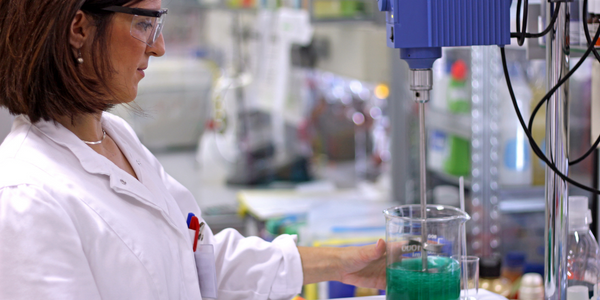Download PDF
Zymergen unifies workflows and accelerates research with Benchling
Technology Category
- Platform as a Service (PaaS) - Data Management Platforms
Applicable Industries
- Life Sciences
- Chemicals
Applicable Functions
- Product Research & Development
- Quality Assurance
Use Cases
- Collaborative Robotics
- Predictive Maintenance
Services
- Cloud Planning, Design & Implementation Services
- Data Science Services
The Challenge
Zymergen, a high-growth biotechnology company, was facing organizational challenges due to its rapid growth. The company was using many custom software systems and algorithms to push research boundaries. However, as the company grew, it struggled to organize its rapidly growing R&D team, ensure streamlined collaboration among scientists working across different labs and teams, scale its R&D organization without losing institutional knowledge, and integrate custom software platforms and algorithms with best-in-class software tools.
About The Customer
Zymergen is a high-growth biotechnology company that uses proprietary algorithms to create essential chemicals and novel materials from clean, renewable sources. The company 'programs' microbes to produce high-value commercial molecules and counts several Fortune 100 companies among its customers. In June of 2015, it raised $44 million in venture funding in a round led by Data Collective. As the company grew, it faced challenges in organizing its rapidly growing R&D team and ensuring streamlined collaboration among scientists working across different labs and teams.
The Solution
Benchling’s collaborative research platform was integrated into Zymergen’s existing systems to empower its scientists to accelerate their research onto a single enterprise solution. This minimized unproductive time in the lab and streamlined collaboration in a secure and compliant manner. Benchling’s customizable lab notebook project structure allowed Zymergen’s growth to continue to accelerate. Intuitive tools along with robust on-site training allowed for full on-boarding and ensured strong end user compliance within days. Benchling integrated with Zymergen’s custom systems, ensuring that existing tools and custom algorithms could be used to their full potential.
Operational Impact
Related Case Studies.

Case Study
Honeywell - Tata Chemicals Improves Data Accessibility with OneWireless
Tata was facing data accessibility challenges in the cement plant control room tapping signals from remote process control areas and other distant locations, including the gas scrubber. Tata needed a wireless solution to extend its control network securely to remote locations that would also provide seamless communication with existing control applications.

Case Study
Advanced Elastomer Systems Upgrades Production
In order to maintain its share of the international market for thermoplastic elastomers AES recently expanded its Florida plant by adding a new production line. While the existing lines were operating satisfactorily using a PROVOX distributed control system with traditional analog I/O, AES wanted advanced technology on the new line for greater economy, efficiency, and reliability. AES officials were anxious to get this line into production to meet incoming orders, but two hurricanes slowed construction.
Case Study
Wireless GPS Tracking & Security Monitoring
Enhancing the security of hazardous freight and ensuring compliance with Homeland Security’s Transportation Security Administration mandate that all trains carrying chemicals capable of creating a toxic inhalation condition are equipped with on-board safety monitoring systems.

Case Study
Field Device Asset Management For Chemical Company in China
Chinese chemical subsidiary of multinational corporation serves customers throughout the world. Sales offices and research and technology centers are strategically located to provide rapid response to customer requests. Just two workers were assigned to maintain thousands of intelligent instruments in three production units, so they could do little more than react to device issues as they appeared. This costly maintenance method inevitably led to unexpected downtime when a critical instrument failed. Plant management recognized the need to change from reactive to predictive maintenance for all assets, including instruments and control valves, but help was needed in implementing such a technology-based initiative.

Case Study
Industrial Workforce Mobility for Improved Safety & Operations
Huntsman Corporation, a global manufacturer and marketer of differentiated chemicals, undertook an aggressive program to eliminate injuries, product defects, and environmental releases at their Port Neches facility. Termed “Project Zero”, this program required a completely mobile solution to empower operations and maintenance personnel to capture defects, track work progress and make process and safety related decisions in real-time.





